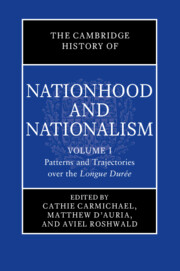Book contents
- The Cambridge History of Nationhood and Nationalism
- The Cambridge History of Nationhood and Nationalism
- The Cambridge History of Nationhood and Nationalism
- Copyright page
- Contents
- Figures
- Contributors
- General Introduction
- Part i The Politics of Ethnicity, Nationhood, and Belonging in the Settings of Classical Civilizations
- Part ii Paradigm Shifts and Turning Points in the Era of Globalization, 1500 to the Present
- Index
General Introduction
Published online by Cambridge University Press: 27 October 2023
- The Cambridge History of Nationhood and Nationalism
- The Cambridge History of Nationhood and Nationalism
- The Cambridge History of Nationhood and Nationalism
- Copyright page
- Contents
- Figures
- Contributors
- General Introduction
- Part i The Politics of Ethnicity, Nationhood, and Belonging in the Settings of Classical Civilizations
- Part ii Paradigm Shifts and Turning Points in the Era of Globalization, 1500 to the Present
- Index
Summary
Since the early 1980s, the study of nationalism has been revived as a distinct subject of enquiry in its own right.1 The seminal works of Ernest Gellner, Benedict Anderson, Eric Hobsbawm, and Anthony D. Smith, published in the 1980s and 1990s and now classics, have contributed to radically changing our reading of nationalism, offering paradigms for both its deeper understanding and radical deconstruction.2 Crucially, these scholars set the main terms of a debate that is still ongoing today. The major distinctions among the advocates of perennialism3 (fewer and fewer), the so-called modernists (still the predominant school), and Anthony Smith’s ethno-symbolists (ever growing in number), have remained largely intact to this day, more than thirty years later.
- Type
- Chapter
- Information
- Publisher: Cambridge University PressPrint publication year: 2023

